|
|
|
Sort Order |
|
|
|
Items / Page
|
|
|
|
|
|
|
| Srl | Item |
| 1 |
ID:
128388
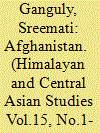

|
|
|
|
|
| Publication |
2011.
|
| Summary/Abstract |
In the context of conventional notion of Afghanistan's foreign policy strategy, two countries are accorded the most prominent status- the U.S. and Pakistan. Russia, on the other hand, shares a unique relationship with Afghanistan. The role of the buffer state, as played out by Afghanistan, during the 19"' century, halted Russian adventure towards ' South Asia, and Russian invasion of Afghanistan proved to be so much of a miscalculated affair as the misadventure led to the collapse of the Soviet Union itself. But even now, Russia has a great stake in Afghanistan's stability and is still considered to be a stabilizing factor in Afghanistan's security scenario. This paper analyzes the different phases of Russian involvement in Afghanistan in t international strategic environment.
|
|
|
|
|
|
|
|
|
|
|
|
|
|
|
|
| 2 |
ID:
128389
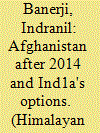

|
|
|
|
|
| Publication |
2011.
|
| Summary/Abstract |
Current speculation on the future of Afghanistan revolves around 2014, the year US forces are supposed to finally end their Afghan War mission. The key question is what will happen once the Americans depart? What sort of Afghanistan would emerge after that? Would the Taliban once again overrun that country and establish a ruthless Islamic emirate? Or would the pro-West regime in Kabul survive with the aid of the fledgling Afghan National Army and police? And where would all that leave India?
|
|
|
|
|
|
|
|
|
|
|
|
|
|
|
|
| 3 |
ID:
128387
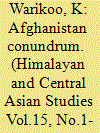

|
|
|
|
|
| Publication |
2011.
|
| Summary/Abstract |
Located at the crossroads of Central, South and West Asia and sharing. its borders with Central Asian Republics of Tajikistan, Uzbekistan and Turkmenistan on the north, Chinese province of Xinjiang in the east, [ran on the west and south west, and Pakistan and Pak-occu pied Kashmir on the south and south east, Afghanistan occupies a unique geo-strategic placement in the region. Distinct ethno-linguistic groups settled in different parts of .»'\fghanistan have diverse social moorings and political affiliations and aspirations. Th us the 'I'ajil
|
|
|
|
|
|
|
|
|
|
|
|
|
|
|
|
| 4 |
ID:
128381
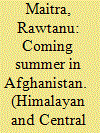

|
|
|
|
|
| Publication |
2011.
|
| Summary/Abstract |
Almonds are not the only ?owers in bloom; the provinces of Kandahar and I-lelmand are awash with opium sap-producing poppies, as well. After two years of steady decline, the United Nations Office of Drugs and Crime (UNODC) predicts a significant growth in opium production in Afghanistan this year. This means one thing, and one thing only: all the international forces - from the offshore bankers to the dollar- a-trip drug mules - who benefit from the multi-billion dollar opiuml heroin business that flourishes under the cover of the ongoing war in Afghanistan are alive and kicking and the insurgents are assured that their financing will remain undisturbed.
|
|
|
|
|
|
|
|
|
|
|
|
|
|
|
|
| 5 |
ID:
128390
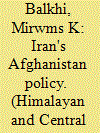

|
|
|
|
|
| Publication |
2011.
|
| Summary/Abstract |
The financial assistance of Iranian authorities to the President of Afghanistan Hamid Karzai in October 2010, has once again sparked the discussion on Iranian policy towards Afghanistan. The fable of "money envelopes" which was delivered by Islamic Republic of Iran by non- diplomatic means remains a hot topic both inside and outside Afghanistan. llamid Karzai confirmed at a press conference that his chief of office receives cash between five to seven hundred thousand Euros: twice each year from Iran. Though the President of Afghanistan clari?ed that this controversial so called financial aid has been part of the' international financial support in which Iran is involved in the post- Taliban reconstruction of Afghanistan, his reply could not convince the- analysts who are experts on Iran and Afghanistan policies. The main reason that the issue became controversial has been theonedia propaganda related to this issue in which Iran is accused of providing military aid and financial support to the Taliban in Afghanistan. The seizure of two thousand oil tankers by Iranian government which resul - _ in a large anti-Iranian demonstration in Kabul against the Iran emba _ highlighted the issue. Few months before, in March 2010, Irani President Mahmud Ahmadinezhad during his visit to Kabul emphas' - y. Iran's disagreement over the presence of NATO in Afghanistan. He sai to regional peace."
|
|
|
|
|
|
|
|
|
|
|
|
|
|
|
|
| 6 |
ID:
128391
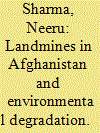

|
|
|
|
|
| Publication |
2011.
|
| Summary/Abstract |
The politico-military conflicts are constant in history. These politico-military conflicts have been deeply entrenched in human society. century has been the biggest producer of war and conflicts victims. All major wars and politico- military con?icts of the twentieth century, including the conflicts in Afghanistan, have one hidden causality and, that is, environment. Amid politico-military conflicts, brutality, death and deprivation, environment may seem a minor causality but actually by which new expectations can be formed.' The vast majority of armed conflicts today are not traditional wars between states or coalitions of states, but rather internal conflicts.
|
|
|
|
|
|
|
|
|
|
|
|
|
|
|
|
| 7 |
ID:
128373
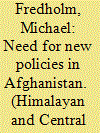

|
|
|
|
|
| Publication |
2011.
|
| Summary/Abstract |
A decade has passed since the defeat of the Taliban government in Afghanistan, and it is hardly surprising that several member-states of the International Security Assistance Force (ISAF) wish to pull out their military forces from Afghanistan, or have already decided to do so. Yet, at first glance not even one of Afghanistaifs multiple problems appears to have been resolved. The Taliban insurgents remain a viable force, and violence regularly occurs throughout the country. The casual observer may well wonder whether the security assistance provided by the international coalition has been of any use at all. Indeed, the ISAF members in many ways appear to have followed contradictory and self-defeating policies in their valiant attempt to remake war-tom Afghanistan into a Western democracy overnight. While not all their efforts have been in vain, more could have been achieved if the realities of Afghanistan had been better understood by those who formulated ISAF policy. The reason for this failure in understanding the Afghan human landscape would seem to depend on two factors: first, an emphasis on do-good policies that included the immediate
introduction of democracy under a strong, central government - which appealed to Western voters but had already been proven futile or outright misguided in almost a century of Afghan attempts at state and nation-
building; second, the lack of a properly focused intelligence effort in Afghanistan, with sufficient resources and the goal to monitor conditions in the country instead of a single-minded focus on targeting in support
of actions against individual terrorists ("the War on Terror"). Or, put in different terms: while Westem military might initially was successfully brought to bear on the Taliban movement, the brain of the military was.
|
|
|
|
|
|
|
|
|
|
|
|
|
|
|
|
| 8 |
ID:
128386
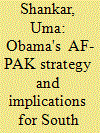

|
|
|
|
|
| Publication |
2011.
|
| Summary/Abstract |
The Af-Pal< strategy of Obama Administration marks a distinct stage in the evolution of the US policy towards Afghanistan since Septemberl 1, 2001. It draws upon the inadequacies of the Afghan policy of the Bush Administration which apparently believed in the rhetoric of war against terror but did not adopt effective strategy with well defined priorities. 'The Bush Administration's objectives were threefold: defeat of Al Qaeda, destruction of the Taliban supportbase and blind determination to bring democracy to Afghanistan and the wider Muslin world. Beyond these general aspirations, the US government during the Presidency of George Bush, never had an Afghanistan or Pakistan strategy let alone an At'-Pal: strategy'.' Pakistan's covert support to Taliban leading to its resurgence and the inability of the US forces in hunting down Al Qaeda and the Taliban were causing uneasiness in the minds of the US leaders. Yet George Bush did not take any substantial initiatives in order to match anti-terror rhetoric. He was not prepared to review the traditional 'perception of the United States towards Pakistan, whose military regime had, as a matter of convenience, suddenly turned into the US ally against terror.
|
|
|
|
|
|
|
|
|
|
|
|
|
|
|
|
| 9 |
ID:
123442
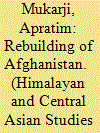

|
|
|
|
|
| Publication |
2011.
|
| Summary/Abstract |
Ten year on since its deliverance from the vicious clutch of the obscurantist Taliban, Afghainstan today is bestest by problems created and coumpounded by a largely unsuccessful US-led military campaign. The civilian population is largely alienated by wanton deaths of innocents is misdirected NATO ground assaults, aerial bombardments, and drone attacks. Also saddled with a decade-old regime largely confined to urban centres, President Hamid Harzai is demoralized not only by his failure to build a domestic support base but also by his complete disenchantment with the United States and other Western allies, which has led to his subsequent and desparate search for allies among the Taliban themselves. Meanwhile, both Pakistan on the eastern front and Iran on the Western front brazenly continue to play their own games by promoting proxies within the indigenous fundamentalist forces. Besides, drug trafficking and corruption, among a host of other problems, continue to defy solutions. By no means, a beguiling picture that the South Asian country today presents to the world.
|
|
|
|
|
|
|
|
|
|
|
|
|
|
|
|
| 10 |
ID:
128364


|
|
|
|
|
| Publication |
2011.
|
| Summary/Abstract |
Ambiguous, often contradictory, assessments of the achievements of NATO/ISAF operations in Afghanistan make it difficult to form a clear picture of the situation on the ground.' However, there is a strong perception that the coalition troops are ?oundering in a quagmire. What began as a campaign with a fairly precise set of objectives soon escalated into a grandiose attempt to re-form an entire society. Today, despite the rhetoric of politicians and military leaders who speak of 'sticking it Out' till the job is done, there are unmistakable signals that, as Lord Ashdown commented in November 2010, the endgame has started.' Whether or not a workable strategy has ?nally been put in place is uncertain, what is clear is that electorates back home have lost patience with the mission. Thus the emphasis now is to fashion an exit strategy that will provide a facade of success, justifying, albeit weakly, the claim of 'mission accomplished'.
|
|
|
|
|
|
|
|
|
|
|
|
|
|
|
|
| 11 |
ID:
123426
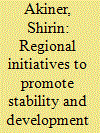

|
|
|
|
|
| Publication |
2011.
|
| Summary/Abstract |
Ambigous, often contradictory, assessments of the achievements of NATO/ISAF operations in Afghanistan make it difficult to form a clear picture of the situation on the ground. However, there is a strong perception that the coalition troops are floundering in a quagmire. What began as a campaign with a fairly precise set of objectives soon escalatedinto a grandiose attempt to re-form an entire society. Today, despite the rhetoric of politicians and military leaders who speak of 'sticking it out' till the job is done, there are unmistakable signals that, as Lord Ashdown commented in November 2010, the endgame has started. Whether or not a workable strategy has finally been put in place is uncertain, what is clear is that electorates back home have lost patience with the mission. Thus the emphasis now is to fashion an exit strategy that will provide a facade of success, justifying, albeit weakly, the claim of 'mission accomplished'.
|
|
|
|
|
|
|
|
|
|
|
|
|
|
|
|
| 12 |
ID:
128369
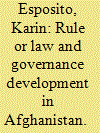

|
|
|
|
|
| Publication |
2011.
|
| Summary/Abstract |
Transition Stability, Democratic Governance And Economic Development In Afghanistan Require The Effective And Successful Incorporation And Prioritization Of Rule Of Law Programming.' The governments Of Afghanistan And The United States Have Both Been Proactive In The Last Yea Rs In Developing Programs And Projects To Enhance Good Governance While Including Rule Of Law Elements In National Strategies. This Paper Is A Reflection On The Context Of The Governance Components That Are Being Addressed In Major Policies, Programs And Positions Of The Governments ' Of Afghanistan And The United States And Other Major International Organizations And Actors Active In The Building Of A New Afghanistan. Specifically, This Paper Also Places In The Political And International Development Context The Growing Emphasis In Afghanistan On Rule Of Law And Democratic Governance. At The Same Time, For Security Reasons, The United States Continues To Be Focused On Governance And The Pursuit Of Peace, Democracy And The Rule Of Law Are Now Conceptually And Programmatically Linked In Afghanistan. Although Legal, Sustainable And Competitive Economic Growth (Including Poverty Reduction As A Whole) Generally Overshadow The Picture Of The Growing Movement To Support Rule Of Law Programming, It Is Now A Priority To Include Funding Concepts On Governance And Rule Of Law. The One ' This Paper Represents The Personal View Of The Author.
|
|
|
|
|
|
|
|
|
|
|
|
|
|
|
|
|
|
|
|
|